Sarawak keen to work with EU in tackling climate change
Sarawak Premier Tan Sri Abang Johari Tun Openg (third left) launching InvestSarawak at the EU-Malaysia Business Day networking dinner in Kuching on Wednesday (Feb 14) night. – ZULAZHAR SHEBLEE/The Star KUCHING: Sarawak is keen to work with the European Union (EU) on mitigating climate change, says Tan Sri Abang Johari Tun Openg. The Premier said the EU had experience and technology while Sarawak’s strength was in its natural resources and renewable energy. “Although we are a small state, we feel we have the responsibility to assist in addressing climate change and reducing carbon emissions. “You are welcome to explore which areas you can collaborate with us on this and together we can help the world,” he said at the EU-Malaysia Business Day networking dinner here on Wednesday (Feb 14) night. Abang Johari said other potential areas of collaboration were in digitalisation and education. “Perhaps we can send our students to study in Europe,” he said. Abang Johari also launched InvestSarawak, the state’s investment and trade agency, at the same event. InvestSarawak will serve as a one-stop centre and first point of contact for all investors in the state. It will be the key facilitator for investors in the development, applications and approvals for investment projects in Sarawak, besides improving the ease of doing business. Deputy Premier Datuk Amar Awang Tengah Ali Hasan said InvestSarawak was a pivotal initiative which aimed to transform the investment landscape, increase trade and improve talent attraction in the state. “It will play a key role serving as facilitator and adviser to provide invaluable local insights to all investors, both foreign and domestic,” he said.
Awang Tengah receives courtesy call from Kuwait petroleum firm delegation
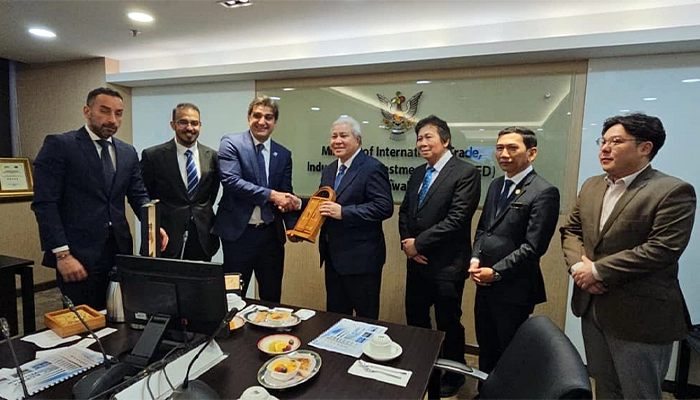
KUCHING (Jan 19): Deputy Premier Datuk Amar Awang Tengah Ali Hasan received a courtesy call from Kuwait Foreign Petroleum Exploration Company (KUFPEC) at his office in Wisma Sumber Alam here yesterday. According to a news release, the KUFPEC delegation was led by its country manager Mohamad Al-Sabti. Awang Tengah, who is International Trade, Industry and Investment Minister, chaired the meeting which was held to discuss investment opportunities between Sarawak and KUFPEC in oil and gas. Also present were Deputy International Trade, Industry and Investment Minister Datuk Dr Malcolm Mussen Lamoh and representatives from Petroleum Sarawak Berhad (Petros), Sarawak Energy Berhad and InvestSarawak.
Mark Carney sees ‘massive disconnect’ in green finance rhetoric

There’s plenty of money to be made by investing in the green energy transition, and financial professionals who say otherwise aren’t paying attention to the facts, according to Brookfield Asset Management Ltd. chair Mark Carney. There’s a “massive disconnect” between what some of the heavyweights of global finance are saying and the wave of money flowing into green projects, Carney, who’s a former governor of the Bank of Canada and Bank of England, said on Jan. 17 at the Bloomberg House in Davos, Switzerland. Article content Article content The comments follow a pivot in the messaging from bankers and asset managers, who have started using global summits to remind governments they’ll only back the green transition if there’s a profit to be made. It’s a mantra that’s being repeated at Davos. Speaking at a panel earlier on Wednesday, hedge fund billionaire and Bridgewater Associates founder Ray Dalio said “there’s this notion of ‘we should we should we should,’ but there’s the fact of who has the money, what is the size of it and what are their motivations.” Carney said that tracking green investment flows shows there’s enough motivation among the holders of capital to back the transition. In 2023, investors plowed 1.8 times as much into clean energy as they did into fossil fuels, according to the International Energy Agency. And the US$1.8 trillion that was spent globally on clean energy last year is expected to rise to US$4.5 trillion annually by the early 2030s, the IEA estimates. “That 1.8 trillion is going to make a very good returns,” Carney said. “Not every single investment, but the whole thing will make a very good investment elevator pitch.” Last year, many investors in traditional green assets lost money, as wind and solar producers were pummelled by higher interest rates. The S&P Global Clean Energy Index ended 2023 down more than 20 per cent, and has slipped a further 9.5 per cent in January. By comparison, the S&P 500 rose 24 per cent last year and is little changed so far in 2024. Carney said transition finance is an area in which investors stand to generate profits. “If you focus on going where the emissions are, you get paid for helping to solve climate change, and that’s now the reality,” he said. “You get paid more for doing that in the advanced world than you do in the developing, in emerging world, something we’ve got to fix with policy and finance, but because you get paid, you can do both: have a massive impact and, and make returns for your investors.” Carney, who served as governor of the Bank of England between 2013 and 2020, also commented on the U.K.’s green agenda, including a perceived retreat from climate policies by Prime Minister Rishi Sunak. “What I didn’t like — at least what it looked like to me — is that policies were being taken off the table without, certainly without replacements being put in and they were being done for purely political signalling purposes,” he said. “That’s what it appeared. And that isn’t the right environment to keep investment focused and flowing as much as it should. And it’s also, it’s just not good climate policy.” Article content Carney also touched on the outlook for the next few COP climate summits. What happens in Brazil, which will host the 30th Conference of the Parties to the United Nations Framework Convention on Climate Change in 2025, “is critical for the climate,” he said. Brazil’s ecological transformation plan “is significant in and of itself, but potentially very significant” in that “it can help create whole new financing flows around biodiversity, around nature at a scale that’s material,” he said. Carney also is United Nations Special Envoy for Climate Action and Finance and chair of Bloomberg Inc. Together with Michael R. Bloomberg, the founder of Bloomberg News parent Bloomberg LP, he co-chairs the Glasgow Financial Alliance for Net Zero.
Japan’s Sumitomo and Eneos toproduce green hydrogen in Malaysia

Hydroelectric-derived power will boost decarbonization drive TOKYO — Oil company Eneos and trading house Sumitomo Corp. will produce “green”hydrogen in Malaysia and export much of it to Japan under plans announced Monday,hoping to further diversify the supply of the fuel essential for decarbonization. The two Japanese companies have signed an agreement with SEDC Energy, a subsidiaryof the Sarawak Economic Development Corp. set up by the Malaysian state of Sarawak.They will also consider establishing a special-purpose company with the Malaysianpartner. Power from hydroelectric plants will be used to electrolyze water to produce the greenhydrogen without emitting carbon dioxide. The aim is to produce 90,000 tonnes a yearby 2030. The scale of investment will be finalized moving forward. SEDC Energy will take the lead on power procurement and hydrogen production, withEneos to provide technical support for the production. Eneos will also contributeproprietary technology for transporting the hydrogen by sea at room temperature.Sumitomo will evaluate project feasibility and financing. Hydrogen, which does not produce CO2 when burned, is essential for decarbonizationin such fields as power generation, transportation and manufacturing. But it isexpensive to produce in Japan, where renewable-energy costs are high. The Japanese government has set a goal of increasing the supply of hydrogen in Japanto 3 million tonnes per year by 2030, and Eneos and Sumitomo are working to produceand transport green hydrogen from around the world.
InvestSarawak dan Surbana Jurong tandatangani MoU perkukuh inisiatif ekonomi hijau
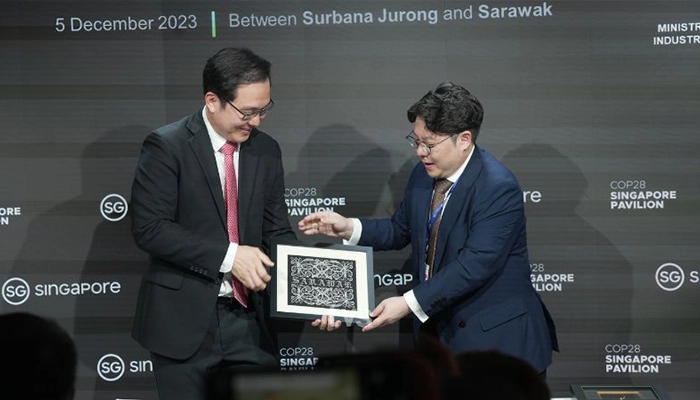
DUBAI, 5 Dis: InvestSarawak dan Surbana Jurong Infrastructure Pte Ltd menandatangani Memorandum Persefahaman (MoU) untuk memperkukuh inisiatif ekonomi hijau di Sarawak. MoU itu ditandatangani Ketua Eksekutif InvestSarawak, Timothy Ong Wye Ern dan Pengarah Urusan Surbana Jurong (Infrastruktur, Tenaga dan Industri) Tan Wooi Leong. Majlis yang berlangsung di Pavilion Singapura di Dubai semasa Persidangan Perubahan Iklim Pertubuhan Bangsa-Bangsa Bersatu (COP28) hari ini, disaksikan Premier Sarawak, Datuk Patinggi Tan Sri Abang Johari Tun Openg. “Daya tarikan Sarawak untuk pelaburan, khususnya dalam sektor yang mampan dan kolaborasi dalam sektor utama seperti pembuatan, pertanian komersial, pelancongan, perhutanan, perlombongan dan perkhidmatan harus ditekankan,” kata Abang Johari. Beliau turut menyatakan komitmen Sarawak untuk pertumbuhan ekonomi yang bertanggungjawab dan mampan, menggabungkan prinsip-prinsip Matlamat Pembangunan Sosial (SDG) dan Pemerintahan, Sosial, dan Alam Sekitar (ESG) ke dalam Strategi Pembangunan Pasca COVID-19 2030 (PCDS 2030). “Matlamat keseluruhan kita adalah untuk mempromosikan kemakmuran ekonomi, inklusiviti sosial dan kelestarian alam sekitar di rantau tersebut,” ujarnya. -TVS
Sarawak’s energy transition: Navigating the technological frontier for sustainable progress
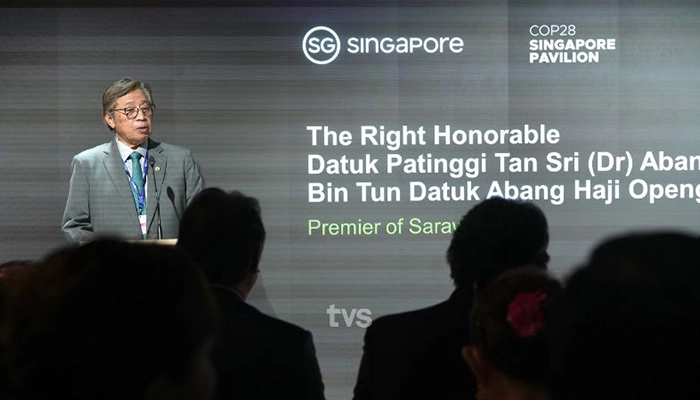
DUBAI, Dec 5: The synergy between technology and resources is crucial for Sarawak’s energy goals, emphasising the strategic utilisation of technological advancements and efficient resource management. Premier of Sarawak, Datuk Patinggi Tan Sri Abang Johari Tun Openg, emphasizes the significance of this transition as he highlights Sarawak’s technological aspirations focus on hydrogen production, a crucial component in the renewable energy landscape. “It’s a question of technology – harnessing the full spectrum of available resources. For instants three years ago, 1kg of hydrogen, requires 60kw of power. “But now we are working with Petronas, in doing our research, it can come down to 38kw,” he told this to reporter when visiting the Malaysian Pavilion after witnessing a Memorandum of Understanding between InvestSarawak and Surbana Jurong Pte Ltd in conjunction with the United Nation Climate Change Conference (COP28) in Dubai. This achievement is attributed to cutting-edge technology, particularly the incorporation of a new membrane in the electrolysis process. Abang Johari expresses optimism for significant cost reductions in hydrogen production over the next five years, anticipating a decrease in power costs. This move positions hydrogen as a more economical and environmentally friendly energy source. Sarawak’s commitment to incorporating hydrogen into its energy portfolio is evident in ongoing public transport initiatives within the region. “The conversion of H2O into hydrogen and oxygen is fueling public transport, with ongoing tests of Autonomous Rail Rapid Transit (ART) and buses powered by hydrogen,” he said. This transition to hydrogen-powered transportation not only signifies a significant step towards reducing carbon emissions but also underscores Sarawak’s commitment to embracing innovative solutions for a sustainable future. In tandem with technological advancements in hydrogen production, Sarawak is diversifying its energy sources. A pioneering approach involves the utilization of wood pallets as a biomass power source, adding a new dimension to Sarawak’s energy matrix and ensuring a diversified and resilient power supply. Abang Johari added that the state is actively involved in reforestation efforts, creating carbon sinks through the replanting of forests. This dual approach, combining technological innovation and environmental conservation, positions Sarawak at the forefront of sustainable energy transitions. – TVS
Courtesy call to Dr. Sim, Deputy Premier of Sarawak and Minister of Public Health, Housing and Local Government
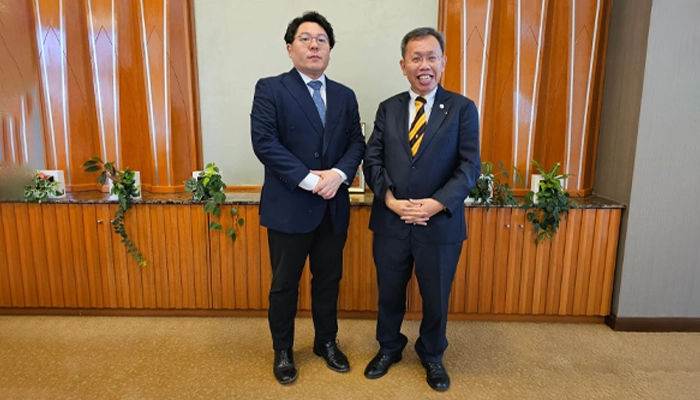
Thank you very much for the courtesy call by Timothy Ong Wye Ern, newly appointed Chief Executive Officer of Invest Sarawak, a new Sarawak Gov one stop Investment centre. #investsarawak Timothy Ong, a fellow Josephian, previously was Senior Deputy Director @ Malaysian Investment Development Authority #MIDA. Head of Circular Economy, Biomass and Renewables Unit. Welcome home Timothy. Together, let’s accelerate the international network for nation building for Sarawak #SarawakFirst #jagasarawakbait2 Skh
Sarawak Budget: RM7 million for InvestSarawak 2023 to boost state’s economy
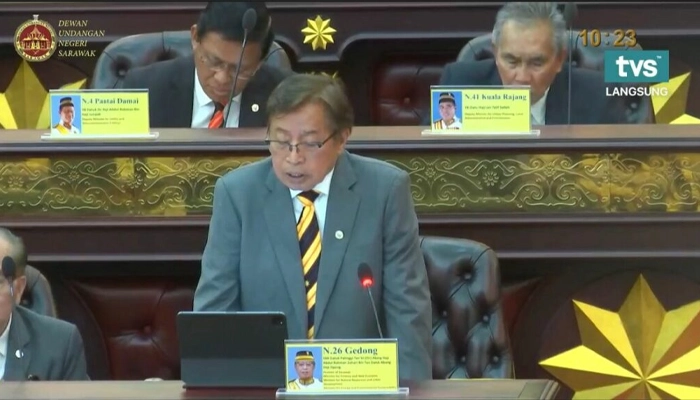
KUCHING, Nov 21: The Sarawak government remains committed to creating an ideal climate for investment through attractive policies and initiatives to shore up the confidence of both local and foreign investors. As such, a total of RM7 million has been allocated for the established InvestSarawak, an entity to attract Foreign Direct Investments (FDI) into the state. Finance and New Economy Minister, Datuk Patinggi Tan Sri Abang Johari Tun Openg said the entity is to spearhead new directions by driving in local and foreign investors to uplift the state’s economy. “In this respect, we have established InvestSarawak to promote Sarawak globally towards attracting foreign direct investment,” he said when tabling the Sarawak Budget 2023 at the Sarawak Legislative Assembly (DUN) Sitting today. On another note, the Premier also highlighted that the state will continue to provide platforms to assist young entrepreneurs to recover their businesses post-pandemic. “Various initiatives will continue to be implemented under the 2023 budget that ensures business continuity, among others, provision of soft loans, interest subsidies, financial assistance for start-ups, product development, capacity building, e-Commerce, and promotion and marketing,” he said. Among them are the Special Relief Fund, Targeted Relief & Recovery Facility (TRRF), and Penjana Tourism Fund (PTF) with an allocation of RM18 million while Skim Kredit Mikro Sarawak and Small and Medium Industries Loan Scheme (SPIKS) were granted RM14 million. – TVS
Up to RM1bil in green financing available to Sarawak SMEs
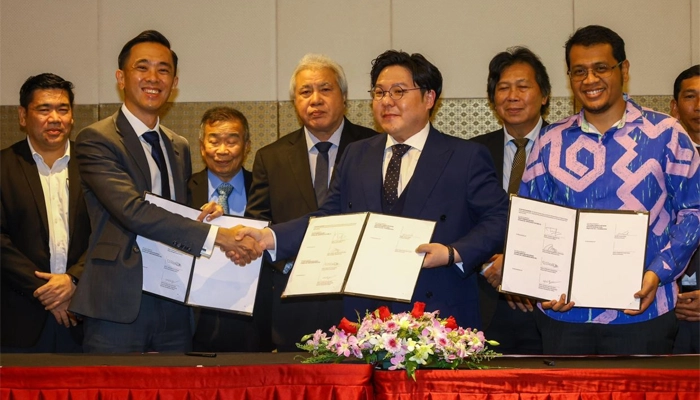
KUCHING: Green financing amounting to RM1bil will be available to Sarawak SMEs to adopt sustainable practices. This comes after a memorandum of understanding (MOU) was signed by InvestSarawak, an agency under the state International Trade and Investment Ministry, the UN Global Compact Network Malaysia and Brunei (UNGCMYB) and Alliance Bank here on Friday (Nov 10). Deputy Premier Datuk Amar Awang Tengah Ali Hasan said the MOU would extend RM1bil in green financing for Sarawakian SMEs in sustainable-trade readiness and business resiliency towards environmental, social and governance (ESG) compliance.
InvestSarawak, UNGCMYB dan Alliance Bank metrai MoU RM1 bilion bantu pembiayaan hijau PKS – Awang Tengah
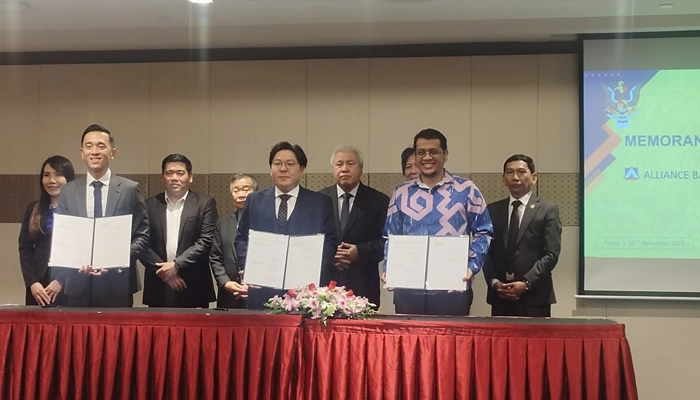
KUCHING, 10 Nov: Memorandum Persefahaman (MoU) di antara tiga pihak telah ditandatangani antara InvestSarawak, UN Global Compact Network Malaysia&Brunei (UNGCMYB) dan Alliance Bank Malaysia Berhad, untuk melanjutkan RM1 bilion dalam skim pembiayaan hijau untuk Perusahaan Kecil Sederhana (PKS) di negeri ini. Timbalan Premier Sarawak Datuk Amar Awang Tengah Ali Hasan berkata bantuan bernilai RM1 bilion itu akan memberi tumpuan kepada pembangunan perdagangan mampan kumpulan sasar. “Dengan bekerjasama dengan pihak yang betul seperti UNGCC, ditambah dengan sokongan institusi kewangan seperti Alliance Banks, kita (Kerajaan Sarawak) boleh menyediakan peralihan yang lancar untuk PKS yang merupakan tulang belakang ekonomi kami,” katanya. Beliau berkata demikian pada Majlis Pelancaran dan Pengenalan Program Pembiayaan dan Pembangunan Inklusif Iklim, di sini, pada Sabtu. Dalam pada itu, beliau meyakini InvestSarawak akan terus membangun sekali gus mempromosikan lebih banyak inisiatif untuk memanfaatkan PKS selepas ini. Hasrat itu menurut harapan beliau agar Sarawak dapat membina rantaian bekalan yang kukuh dan berdaya tahan yang bukan sahaja bertaraf dunia, tetapi mampan dalam semua aspek. Terdahulu, Kementerian Perdangangan Antarabangsa, Industri dan Pelaburan (MINTRED) Sarawak itu mendedahkan sehingga September, Kerajaan Sarawak telah meluluskan pelaburan bernilai RM 11.3 bilion untuk sektor pembuatan. Sementara, MoU itu telah ditandatangani oleh Ketua Pegawai Eksekutif InvestSarawak, Timothy Ong, Pengarah Eksekutif UNGCC, Faroze Nadar dan Ketua Kumpulan Strategi, Pemasaran dan Pembangunan Perniagaan Bank Alliance Malaysia, Dr Aaron Sum Wei Wern. Hadir sama Penasihat MINTRED, Datuk Naroden Majais dan Pemangku Setiausaha Tetap MINTRED, Dzulkornain Masron.– TVS

